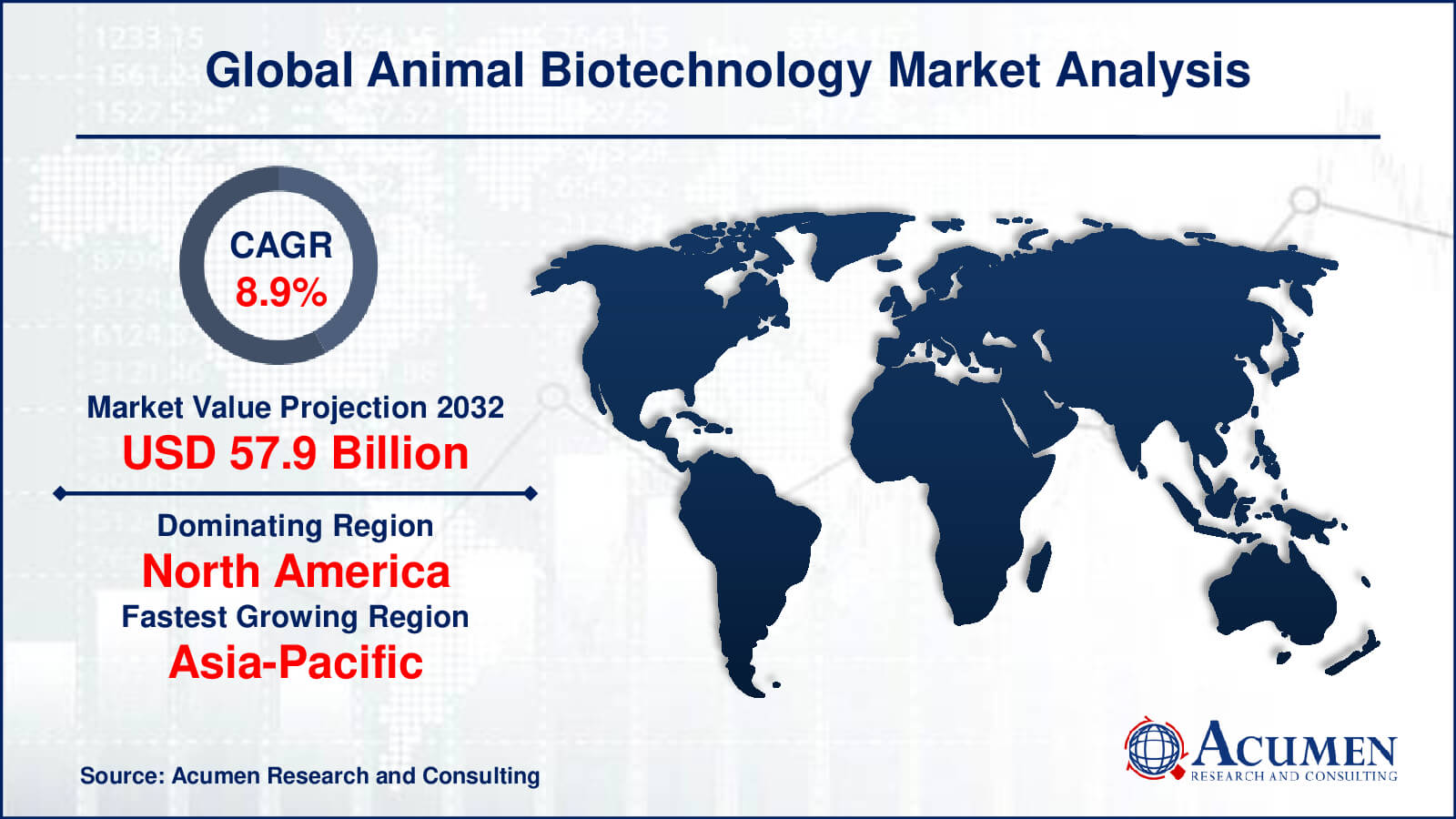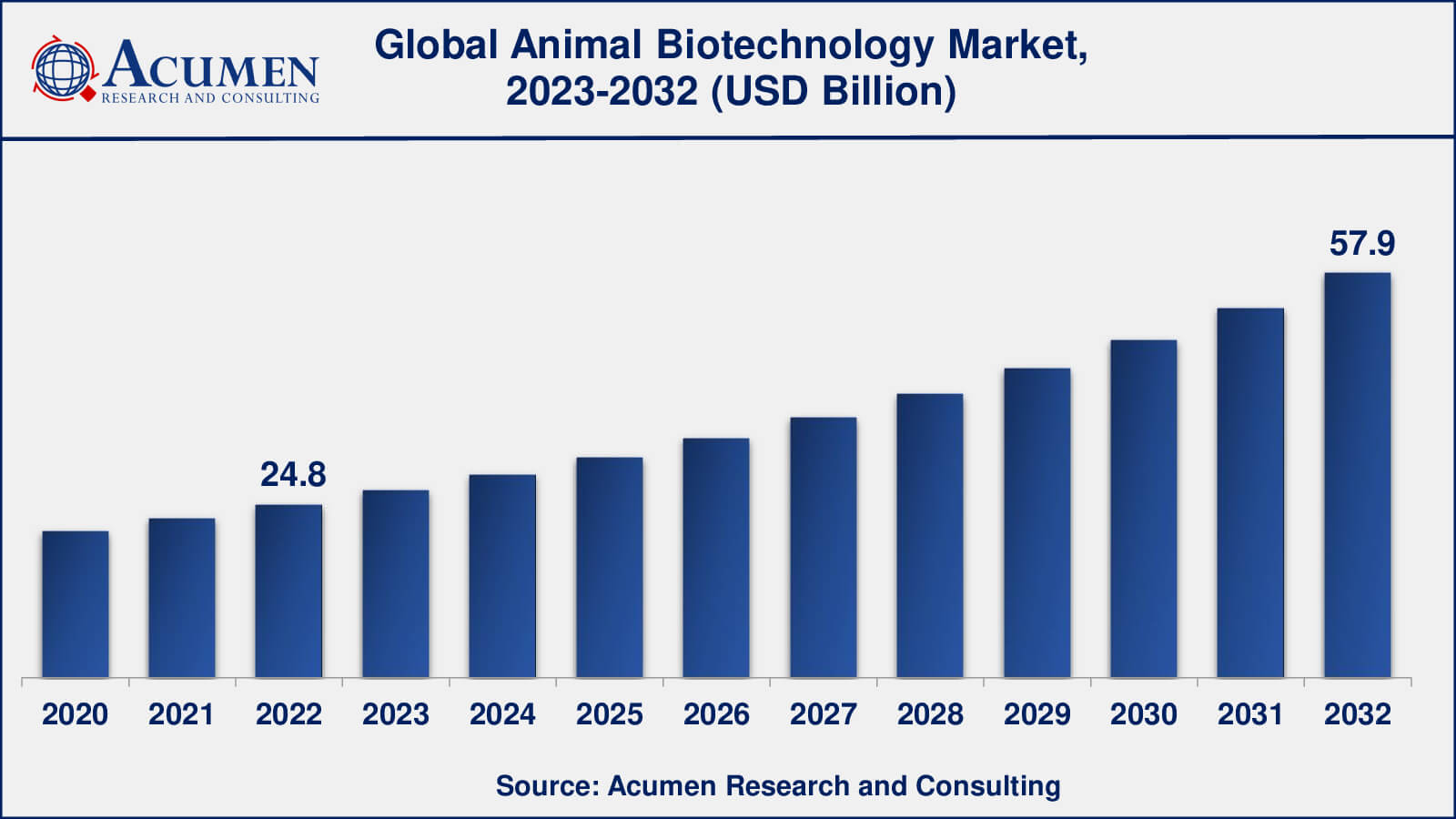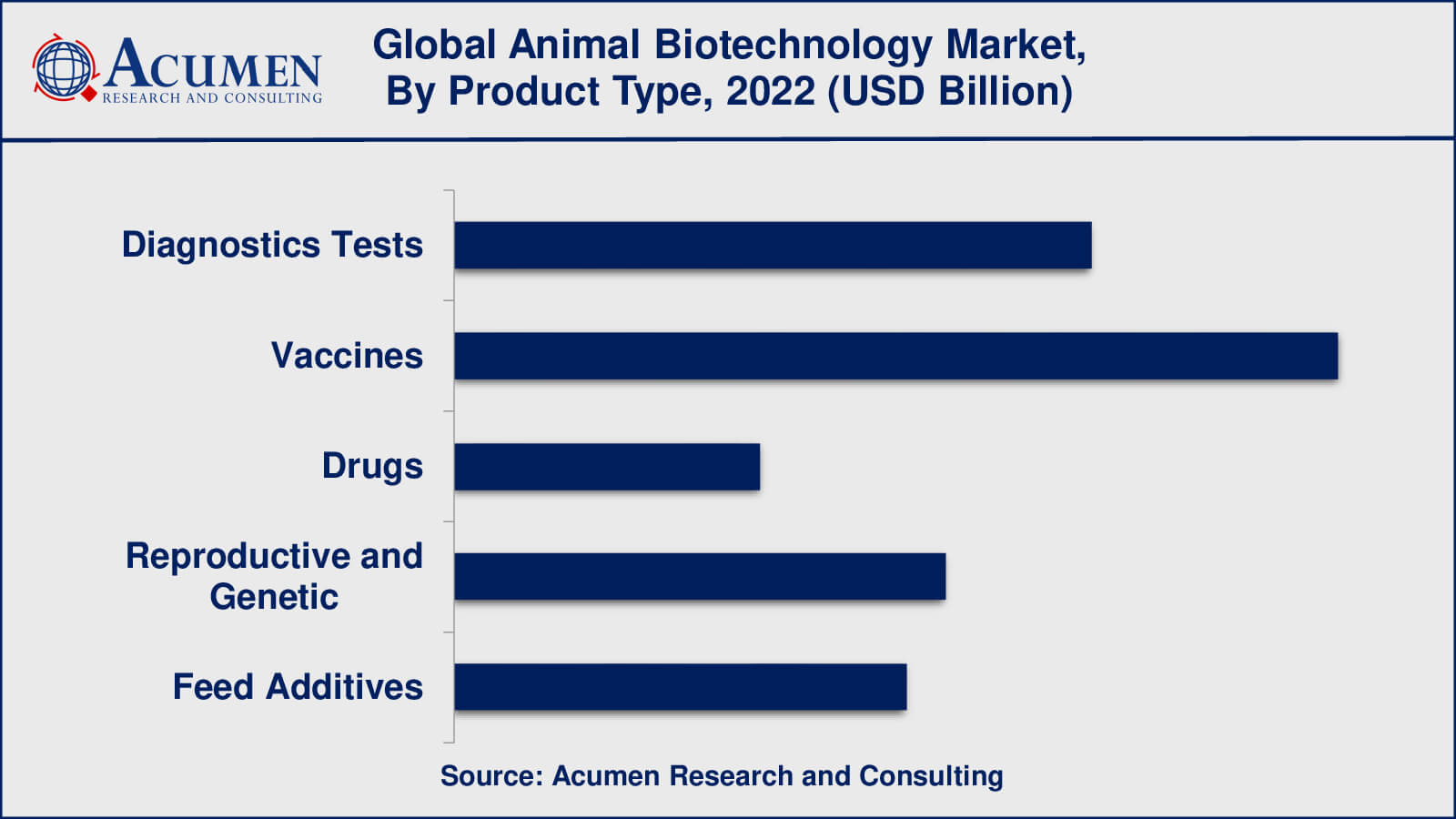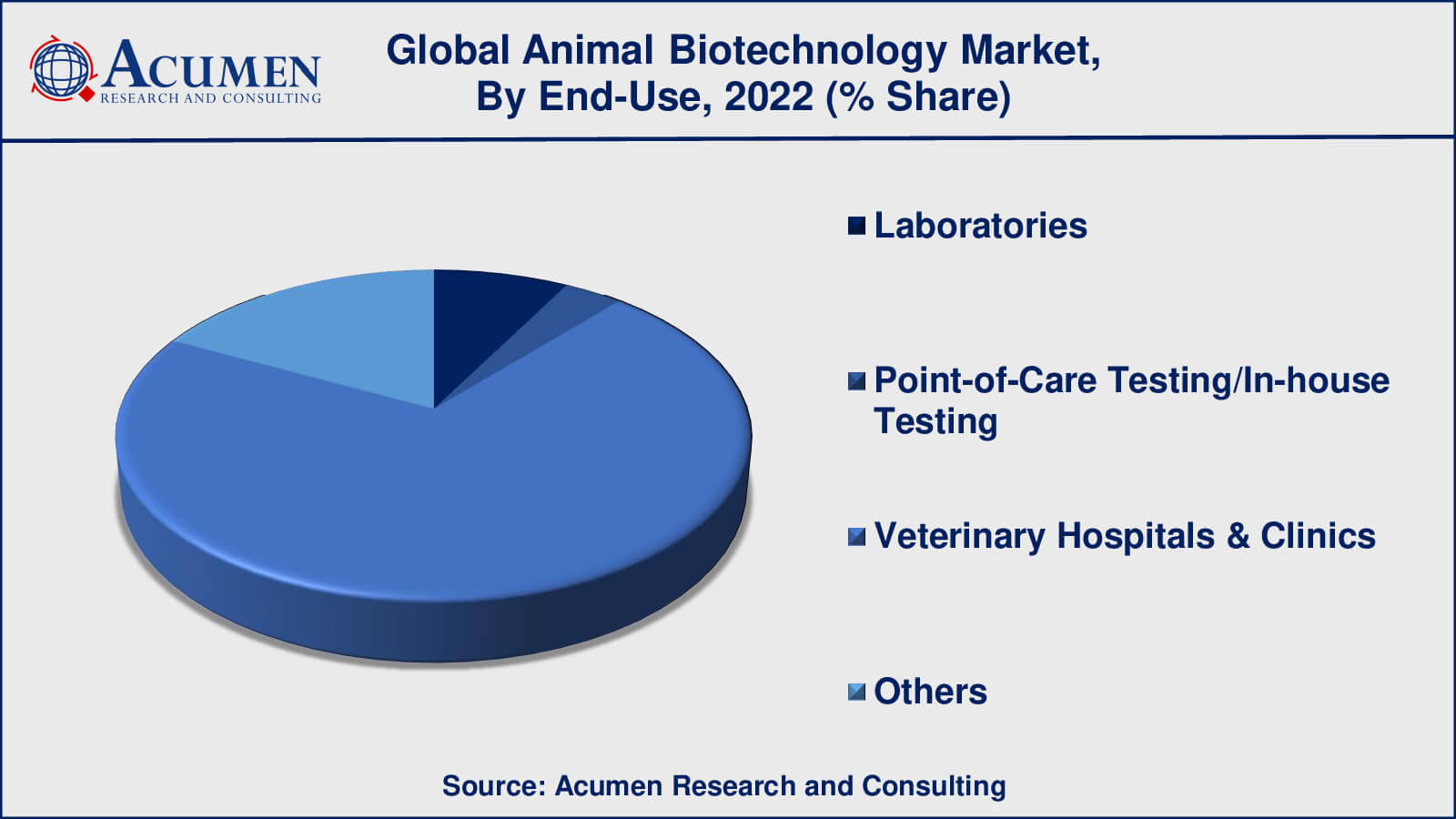Animal Biotechnology Market Size - Global Industry, Share, Analysis, Trends and Forecast 2023 - 2032
Published :
Report ID:
Pages :
Format :
Animal Biotechnology Market Size - Global Industry, Share, Analysis, Trends and Forecast 2023 - 2032
Report Coverage
- Industry Dynamics
- Market Size and Forecast Data
- Segment Analysis
- Competitive Landscape
- Regional Analysis with a Niche Focus on Country-Level Data
- High Level Analysis - Porter's, PESTEL, Value Chain, etc.
- Company Profiles of Key Players
- Option to Customize the Report As Per Your Specific Need
Request Sample Report
The Global Animal Biotechnology Market Size accounted for USD 24.8 Billion in 2022 and is estimated to achieve a market size of USD 57.9 Billion by 2032 growing at a CAGR of 8.9% from 2023 to 2032.
Animal Biotechnology Market Highlights
- Global animal biotechnology market revenue is poised to garner USD 57.9 billion by 2032 with a CAGR of 8.9% from 2023 to 2032
- North America animal biotechnology market value occupied around USD 7.7 billion in 2022
- Asia-Pacific animal biotechnology market growth will record a CAGR of more than 9% from 2023 to 2032
- Among product type, the vaccines sub-segment generated over US$ 8 billion revenue in 2022
- Based on end-use, the veterinary hospitals & clinics sub-segment generated around 45% share in 2022
- Development of animal biotechnology for environmental conservation is a popular animal biotechnology market trend that fuels the industry demand

Animal biotechnology is the use of scientific approaches to study and manipulate animal biological systems for a variety of objectives. It entails the application of genetics, cell biology, molecular biology, and other cutting-edge technologies to create new products, improve animal health, and increase food production. Animal biotechnology is in high demand for a variety of reasons. For starters, it enables scientists to investigate the genetic and molecular pathways underlying animal diseases and disorders. This knowledge can aid in the development of novel diagnostic tools, medicines, and vaccines to improve animal health and welfare.
Second, animal biotechnology is critical for increasing food output. It can aid in the production of animals that are disease resistant, have enhanced growth rates, or produce higher quality meat, milk, or eggs. This can assist enhance food output, improve food security, and lessen animal agriculture's environmental effect. Finally, animal biotechnology is critical to conservation efforts. It can assist scientists in better understanding the genetic variety of endangered species, developing breeding programmes to enhance population growth, and developing innovative techniques to safeguard animal habitats.

Global Animal Biotechnology Market Dynamics
Market Drivers
- Increasing demand for animal protein and related products such as milk, eggs, and meat
- Growing prevalence of zoonotic diseases and the need for better animal healthcare
- Advancements in genetic engineering and cloning techniques
- Rising consumer awareness about animal welfare and food safety
- Growing research and development activities in the field of animal biotechnology
Market Restraints
- Ethical concerns regarding genetic manipulation and cloning of animals
- Lack of public acceptance for genetically modified animals and animal products
- High cost of animal biotechnology products and services
- Stringent regulations and approval processes for animal biotechnology products
- Limited infrastructure and technical expertise in developing countries
Market Opportunities
- Development of novel therapies and vaccines for animal diseases
- Increasing adoption of genetically modified animals for drug development and medical research
- Expansion of the animal biotechnology market in emerging economies
- Use of animal biotechnology to improve animal welfare and reduce the use of antibiotics in animal agriculture
Animal Biotechnology Market Report Coverage
| Market | Animal Biotechnology Market |
| Animal Biotechnology Market Size 2022 | USD 24.8 Billion |
| Animal Biotechnology Market Forecast 2032 | USD 57.9 Billion |
| Animal Biotechnology Market CAGR During 2023 - 2032 | 8.9% |
| Animal Biotechnology Market Analysis Period | 2020 - 2032 |
| Animal Biotechnology Market Base Year | 2022 |
| Animal Biotechnology Market Forecast Data | 2023 - 2032 |
| Segments Covered | By Product Type, By Application, By Animal Type, By End-Use, And By Geography |
| Regional Scope | North America, Europe, Asia Pacific, Latin America, and Middle East & Africa |
| Key Companies Profiled | Biogénesis Bagó, Boehringer Ingelheim International GmbH, Elanco, Heska Corporation, HESTER BIOSCIENCES LIMITED, Idexx Laboratories, Indian Immunologicals Ltd., Kareo, Inc., Merck & Co., Inc., NXGN Management, LLC, Virbac, and Zoetis. |
| Report Coverage |
Market Trends, Drivers, Restraints, Competitive Analysis, Player Profiling, Covid-19 Analysis, Regulation Analysis |
Animal Biotechnology Market Insights
Animal biotechnology is a new discipline that studies and manipulates biological processes in animals using modern technologies. This field has extensive uses in agriculture, medicine, and conservation, and it is becoming more essential as the world's population expands and environmental concerns become more severe.
The increasing need for animal protein and related products such as milk, eggs, and meat is one of the key drivers of the animal biotechnology business. This need has resulted in the development of new technology that can improve animal health, increase food output, and lessen animal agriculture's environmental effect. Scientists, for example, can utilize genetic engineering to make animals that are immune to diseases or have faster growth rates, resulting in increased food output and enhanced food security.
Animal biotechnology is also critical for the development of new medicines and vaccines for animal diseases. This can assist enhance animal health and wellbeing while also lowering the danger of zoonotic infections spreading to humans. Furthermore, animal biotechnology can aid in the conservation of endangered species by elucidating their genetic diversity and developing breeding programmes to increase population size.
Despite the numerous potential benefits of animal biotechnology, several challenges must be addressed. One of the key problems is the ethical implications of animal cloning and genetic manipulation. There are also regulatory impediments and approval processes that might make bringing animal biotechnology products to market challenging. Furthermore, the high cost of animal biotechnology products and services may prevent many farmers and researchers from accessing them.
Animal Biotechnology Market Segmentation
The worldwide market for animal biotechnology is split based on product type, application, animal type, end-use, and geography.
Animal Biotechnology Product Types
- Diagnostics Tests
- Vaccines
- Drugs
- Reproductive and Genetic
- Feed Additives

Vaccines are a vital component of animal health management, according to animal biotechnology industry studies, because they assist prevent and control the development of infectious diseases. Vaccines protect animals from a variety of diseases, including viral, bacterial, and parasitic infections. Vaccines, in addition to improving animal health, can assist minimise antibiotic use in animal agriculture, which can help address the rising problem of antibiotic resistance.
Reproductive and genetic technologies play an essential role in the animal biotechnology market since they can assist increase animal genetic quality and productivity. Artificial insemination, in vitro fertilisation, and embryo transfer techniques, for example, can be used to increase breeding efficiency and the number of offspring produced by high-value animals. Genetic engineering techniques can also be used to create animals that are disease resistant, grow faster, or produce higher quality meat, milk, or eggs.
Animal Biotechnology Applications
- Diagnosis of Animal Diseases
- Treatment of Animal Diseases
- Preventive Care of Animals
- Drug Development
- Others
The diagnosis of animal diseases is widely regarded as the most widespread and important use of animal biotechnology. Accurate and prompt disease diagnosis is crucial for disease management and control. Animal biotechnology offers a variety of diagnostic tools and techniques, including as molecular diagnostics, immunodiagnostics, and imaging technologies. These technologies can aid in the detection of disease-causing organisms, the detection of disease outbreaks, and the monitoring of disease progression.
Animal illness treatment is another key application of animal biotechnology. Antibiotics, antiparasitics, and anti-inflammatory medications are among the drugs and therapies available for the treatment of animal ailments. By inventing innovative medication delivery mechanisms, enhancing therapeutic efficacy, and lowering the risk of drug resistance, animal biotechnology can assist increase the success of these treatments.
Another key application of animal biotechnology is animal preventive care. This includes creating vaccines and other prophylactic methods to protect animals from infectious diseases. Animal biotechnology can also contribute to better animal welfare by inventing novel tools for monitoring and managing animal health, such as wearable devices and precision livestock farming practises.
Animal Biotechnology Animal Types
- Companion
- Livestock
According to the animal biotechnology market forecast, the livestock sector is generally considered to dominate the animal biotechnology market due to the large number of animals involved in agricultural production. Animals such as cows, pigs, chickens, and sheep play an important part in meeting global demand for animal-based food products such as meat, dairy, and eggs. Animal biotechnology helps the cattle industry by improving animal health and welfare, increasing output, and lowering environmental impact.
Vaccines, diagnostics, and other technologies based on animal biotechnology have been developed to aid in the prevention and management of infectious illnesses in cattle populations. This has improved animal health and welfare, reduced antibiotic use, and raised consumer food safety. While the cattle industry dominates the animal biotechnology business, the companion animal market is fast developing as pet ownership grows and demand for pet healthcare products and services grows. Animal biotechnology makes a substantial contribution to the advancement of companion animal health and welfare by developing new diagnostics, medications, and therapies for a wide range of diseases and disorders.
Animal Biotechnology End-Uses
- Laboratories
- Point-of-Care Testing/In-house Testing
- Veterinary Hospitals & Clinics
- Others

Veterinary hospitals and clinics are widely regarded as the most important and largest end-use component of the animal biotechnology market. Veterinary hospitals and clinics are critical for providing medical care and treatment to animals, both companion and livestock. Animal biotechnology helps these facilities by offering diagnostic tests, medications, and other items used in the diagnosis, treatment, and prevention of animal diseases.
Diagnostic tests are very significant in veterinary hospitals and clinics because they allow for the speedy and reliable diagnosis of animal ailments. Animal biotechnology offers a variety of diagnostic tests, including as molecular diagnostics, immunodiagnostics, and imaging technologies. These tests assist veterinarians in determining the root cause of an animal's disease and developing an effective treatment plan.
Animal Biotechnology Market Regional Outlook
North America
- U.S.
- Canada
Europe
- U.K.
- Germany
- France
- Spain
- Rest of Europe
Asia-Pacific
- India
- Japan
- China
- Australia
- South Korea
- Rest of Asia-Pacific
Latin America
- Brazil
- Mexico
- Rest of Latin America
The Middle East & Africa
- South Africa
- GCC Countries
- Rest of the Middle East & Africa (ME&A)
Animal Biotechnology Market Regional Analysis
North America is regarded as one of the most important markets for animal biotechnology due to widespread acceptance of new technologies in animal healthcare and increased investment by key businesses. The region has an established veterinary healthcare system as well as a robust regulatory framework that promotes the use of modern animal biotechnology products.
Europe is another important market for animal biotechnology, owing to rising demand for animal-based food items, growing concerns about animal welfare, and the availability of an established animal healthcare infrastructure. The market for veterinary diagnostics and preventive care products is large in the region.
The Asia-Pacific region is predicted to witness substantial expansion in the animal biotechnology market due to rising animal healthcare expenditure, increased livestock production, and more awareness about animal welfare. The region boasts some of the world's greatest livestock populations and a high need for animal healthcare products and services.
Animal Biotechnology Market Players
Some of the top animal biotechnology companies offered in our report include Biogénesis Bagó, Boehringer Ingelheim International GmbH, Elanco, Heska Corporation, HESTER BIOSCIENCES LIMITED, Idexx Laboratories, Indian Immunologicals Ltd., Kareo, Inc., Merck & Co., Inc., NXGN Management, LLC, Virbac, and Zoetis.
In January 2021, Elanco announced the acquisition of Kindred Biosciences, a business dedicated to the discovery of novel biologics for the treatment of animal diseases. Elanco's portfolio of new animal health products is likely to benefit from the acquisition.
In February 2021, Merck & Co., Inc. established collaboration with the International Livestock Research Institute to research novel livestock disease vaccines. Merck's engagement is part of its global efforts to promote animal health and wellbeing.
Frequently Asked Questions
What was the market size of the global animal biotechnology in 2022?
The market size of animal biotechnology was USD 24.8 billion in 2022.
What is the CAGR of the global animal biotechnology market from 2023 to 2032?
The CAGR of animal biotechnology is 8.9% during the analysis period of 2023 to 2032.
Which are the key players in the animal biotechnology market?
The key players operating in the global market are including Biog�nesis Bag�, Boehringer Ingelheim International GmbH, Elanco, Heska Corporation, HESTER BIOSCIENCES LIMITED, Idexx Laboratories, Indian Immunologicals Ltd., Kareo, Inc., Merck & Co., Inc., NXGN Management, LLC, Virbac, and Zoetis.
Which region dominated the global animal biotechnology market share?
North America held the dominating position in animal biotechnology industry during the analysis period of 2023 to 2032.
Which region registered fastest CAGR from 2023 to 2032?
Asia-Pacific region exhibited fastest growing CAGR for market of animal biotechnology during the analysis period of 2023 to 2032.
What are the current trends and dynamics in the global animal biotechnology industry?
The current trends and dynamics in the animal biotechnology industry include increasing demand for animal protein and related products such as milk, eggs, and meat, growing prevalence of zoonotic diseases and the need for better animal healthcare, and advancements in genetic engineering and cloning techniques.
Which product type held the maximum share in 2022?
The vaccines product type held the maximum share of the animal biotechnology industry.



